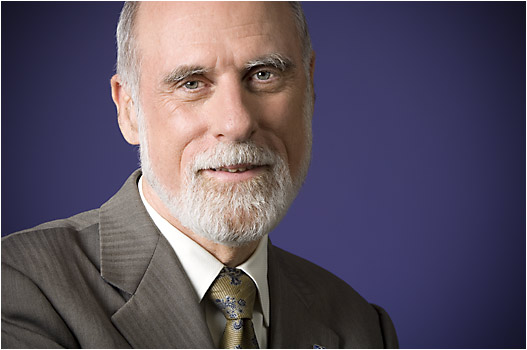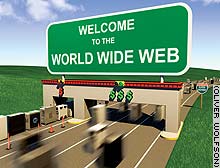
The Current State of Affairs: Should the Internet be Tiered?
When some people hear about net neutrality, the first thing that comes to mind is government regulation. These people want to preserve the internet in its present state, a state in which people can freely express their ideas in a forum as open and egalitarian as possible. These people think that regulation would only impede the freedom associated with the internet when that is desired is to maintain the status quo. To a degree, these people are right, even the most devoted supporters of net neutrality only want to maintain what we have now. What people do not always realize is that even though there is no government regulation at present, the internet has been following these ideals until very recently.

"The remarkable success of the Internet can be traced to a few
simple network principles...which together give consumers...
control. This 'neutral' network has supported an explosion
of innovation at the edges of the network"
- Vint Cerf [*pdf link] Chief Internet Evangelist, Google
To reiterate, the original internet followed the principle of neutrality without the need for any legal intervention.
Tim Berners-Lee, one of the founding fathers of the internet,
stating that the internet was created with the intention that it
remain neutral/non-discriminatory
It was not until fairly recently after the merger of two major telecom (telecommunications) companies AT&T and SBC communications where talks of “tiering” the internet came into light. These companies proposed that there should be a high-speed “tier” to their networks where some services would be favored over others. Sites that choose to pay for this service will then get faster and more reliable service. The desire to stop tiering from taking place is the main reason that interest in net neutrality legislation has ballooned in the last few years.
The Problem with Tiered Internet
Tiered internet will mainly affect the consumer in two ways. The first is in the pocketbook. The second and possibly a bit more difficult to see is what is often called the “gatekeeper” effect, which is the truly dangerous one.
At first glance, tiered internet seems fine; companies that pay more get faster services. However, this goes against the “end-to-end” paradigm that the internet was built on. Few people may have ever heard of this term but all users of the internet rely on this principle. The general gist of this is that all control of what goes on through the internet should be controlled by the producer and the end user, not the intermediary network provider that controls them. By being able to regulate who gets to use the faster more reliable service, they would create what Tim Wu from the Colombia Law School calls “the Tony Soprano business model”. The network owners stand in between the content provider and the end user and elicit money from any bit of information that wants to pass. After that, one of two things can happen. The content provider can choose to pay the fee, the network owners make liberal profit, and the content provider passes the cost onto the consumer. Conversely, the content  provider can opt out of paying and the end user is left with slow-loading and possible even degraded content. Either decision spells trouble for the average consumer. Regardless of which scenario takes place, the result will be monetary loss to the consumer and, even worse, the rise of an internet “gatekeeper”.
provider can opt out of paying and the end user is left with slow-loading and possible even degraded content. Either decision spells trouble for the average consumer. Regardless of which scenario takes place, the result will be monetary loss to the consumer and, even worse, the rise of an internet “gatekeeper”.
Other than content, any bit of information is of the same value as any other. Even then, the desirability of the content is determined by the end user and no one else. However, the whole story would change if tiered internet was to be allowed. It can be assumed that fees to use upper tier would be high. This will probably mean that these people will not be able to afford access this special tier. That leaves the burning question: what about lower tier? Of course, the telecom companies promise that nothing will be degraded or blocked but that is backed only with their word and in light recent events, their word seems less than trustworthy. Madison River Communications is a North Carolina telecommunications company which intentionally blocked voice over IP traffic due to the fact that they also operated regular telephone service and this  traffic was taking away some of their telephone business. While this may seem extreme, it has happened on multiple occasions. The result is still that the telcos (telecommunications companies) use their market power to discriminate what content is fastest and most reliable and in essence become the gatekeepers of what content is shown on the internet. This is often said to be analogous to what has become of cable TV where a small number of powerful corporations decide what programming is shown depending on who can make them the best offer. Even worse, there are now talks of the big network providers such as AT&T and Verizon creating content, especially video content, which need the fast networks the most. If this happens and there is no neutrality provision in place, then there would be little reason for the telcos not to gouge the competition or even degrade their service since they would be indirect competition with content providers.
traffic was taking away some of their telephone business. While this may seem extreme, it has happened on multiple occasions. The result is still that the telcos (telecommunications companies) use their market power to discriminate what content is fastest and most reliable and in essence become the gatekeepers of what content is shown on the internet. This is often said to be analogous to what has become of cable TV where a small number of powerful corporations decide what programming is shown depending on who can make them the best offer. Even worse, there are now talks of the big network providers such as AT&T and Verizon creating content, especially video content, which need the fast networks the most. If this happens and there is no neutrality provision in place, then there would be little reason for the telcos not to gouge the competition or even degrade their service since they would be indirect competition with content providers.
It should come to no surprise that regular people and not major corporations create over 60 percent of the content on the internet. Usually these people are the ones that create such web milestones as Google, yahoo, eBay and craigslist. If a tiered internet existed, the innovative startups that have defined the internet would have been relegated to the slow lane and would not have grown as they did. Instead, these companies would have suffocated from poor quality of service from the telecom companies and the best thing they could hope for is a quick buyout from these massive corporations for much less than they are worth. This leads to a decrease in the amount entrepreneurs willing to venture in new technologies and an overall decrease for innovation.
While this situation may sound dire as is, there are even more ramifications. Take for example, youtube, an online provider of user created video. Let’s say Verizon has a service similar to that of youtube but more restricting and is overall inferior. Because it is the user that chooses what content suits them best, youtube becomes successful since it is deemed superior while Verizon’s service flounders. However, if the internet was tiered, the startup youtube would simply not have enough capital to pay an extra fee to make sure their connection to the end user is reliable on top of their normal fee. On the other hand, Verizon’s service would be infinitely faster and more reliable since they control the pipes on which the data travels and decide to prioritize their service. What concludes is a lopsided battle with Verizon the winner not because the public thought they had a better service but because Verizon chose to favor their own content over others.
In the end, tiering will result in greater profits for the network providers at the expense of the consumer.